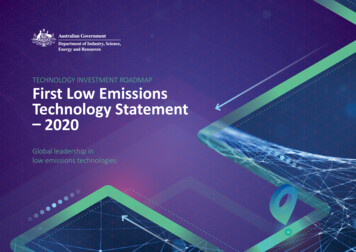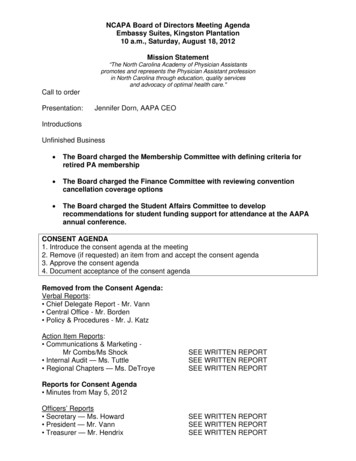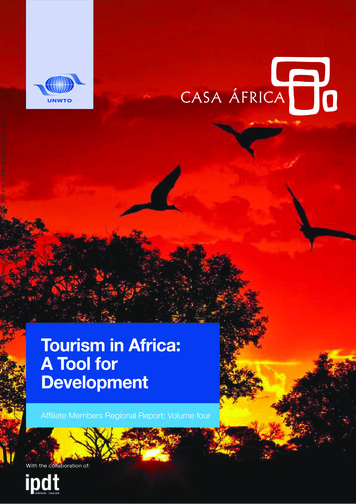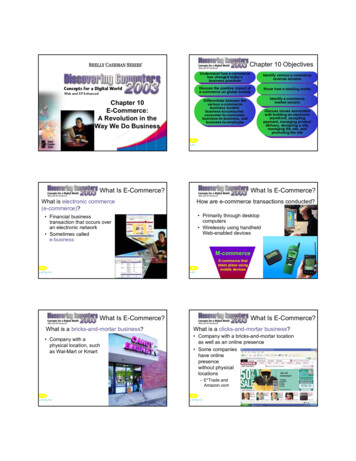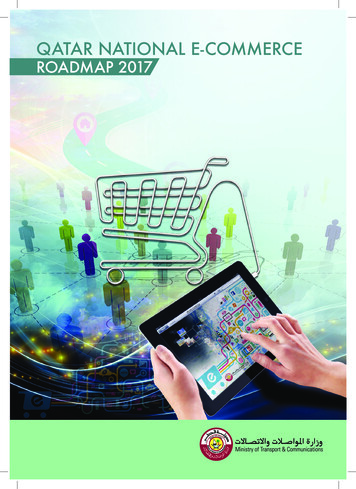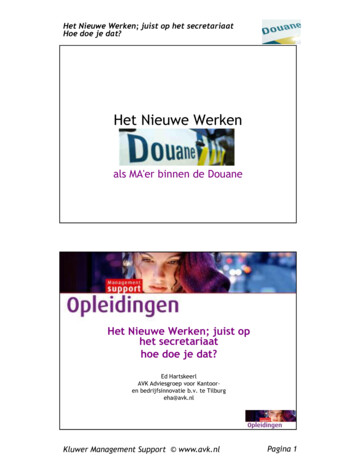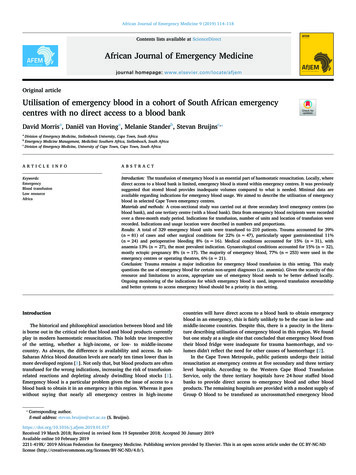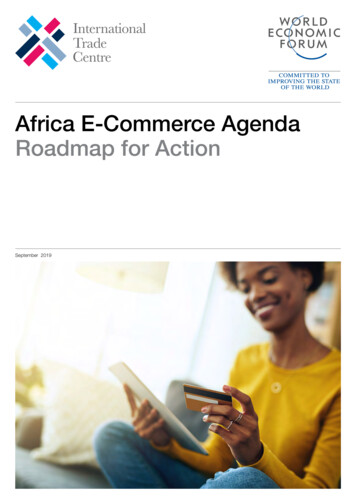
Transcription
Africa E-Commerce AgendaRoadmap for ActionSeptember 2019
02Summary04Introduction042Challenges toE-CommerceGrowth06DevelopingAn ActionAgenda08ActionAgenda24NextSteps
SUMMARYOnline marketplaces could drive inclusivegrowth across Africa, with e-commercelikely to create as many as 3 million jobs by2025. Benefits will include opening marketsto otherwise isolated rural communities,servicing Africa’s fast-growing consumerclass, and offering women access to newbusiness opportunities. Realizing thispotential presents a major opportunity, butwill require significant annual growth, andmust first overcome a number ofchallenges.Africa’s E-commerce Agenda is a call toaction from e-commerce stakeholderswithin and beyond the continent. Led bythe World Economic Forum and the International Trade Centre (ITC) a community ofbusiness leaders and experts haveidentified eight areas for consideration –ranging from refreshing policies toexpanding connectivity, and upgradinglogistics to managing data. Each areacomes with a goal and recommendedsteps.Now is the time to ensure thatthe jobs and inclusive growthpotential of e-commerce iscaptured for Africa.3
INTRODUCTIONThe potential ofe-commerce4E-commerce in Africa is wellunderway, involving business-tobusiness, business-to-consumer,goods and services. Already,estimates suggest as many as264 e-commerce start-ups areoperational across the continent,active in at least 23 countries. Itbrings significant employmentpotential, with online marketplaces set to generate 3 millionjobs by 2025.With action, e-commerce can become aforce for sustainable development. Oneexample is gender. Women entrepreneursincreasingly use digital tools to drivebusinesses, where previously social normsor family duties may have kept them out ofthe workforce.Just 37% of women in Sub-Saharan Africahave a bank account, compared to 48% ofmen. In some cases, fintech can help bringfinancial services directly to women thatmay otherwise have faced legal or culturalbarriers through more traditional routes.CHALLENGESThese will be direct, as well as insupporting services, such aslogistics and payment serviceproviders; customer relationsmanagement, marketing, analyticsand website services andtechnology vendors. In turn,delivery services will needmechanics, job portals requirerecruiters, while any businessrelies on legal, accounting andoffice space.Yet there are challenges to Africa’se-commerce growth. Too many start-upsare unprofitable. Entrepreneurs battleexceptionally low consumer trust ande-skills, low internet penetration andaffordability, uncompetitive deliveryinfrastructure, fragmented markets andrising barriers to cross-border e-payments.According to some estimates, emergingeconomies stand to gain US 3.7 trillion inGDP by greater use of digital finance, yetonly 34% of African adults made orreceived a digital payment in 2017. Despiteincreased digital visibility in neighbouring
markets, intra-regional and globale-commerce trade remains small.Regulations have not kept pace with digitaldevelopments. According to the UnitedNations, 32 of Africa’s 54 nations have lawsin place to govern “e-transactions” (onlineexchange); 23 have laws on data protectionand privacy; and only 20 address onlineconsumer protection.The region also lags behind others in theUNCTAD B2C E-commerce Index, which iscalculated on a set of four compositeindicators highly relevant to onlineshopping.5
Developing anaction agenda6Generating those 3 millionnew jobs assumes a 25-50%annual revenue growth fromAfrica’s current online marketplaces, according to someresearchers, but realizing thesefigures requires action. Acommunity of businesses andexperts led by the WorldEconomic Forum and theInternational Trade Centre (ITC)have identified eight priorityactions for consideration byAfrica’s policy leaders and theinternational developmentcommunity.An ecosystem approachEach area identifies current hurdles, setsgoals and offers references to help reachthem. The agenda recognizes that for anyindividual e-commerce business to prosper,a wide ecosystem of digital technology andsupporting companies must also flourish,with a mix of local and global action needed if growing cross-border activity is thegoal. Many of the actions listed would havebenefits for both online market places anda wider cohort of digital trade businesses.Leveraging existing negotiationsCritically, this action agenda encouragesAfrica’s policy-makers to pursuee-commerce priorities at multiple levels,given its inherently borderless potential.It calls for firmly anchoring e-commercewithin the negotiations on the AfricanContinental Free Trade Area (AfCFTA) andencourages more African governmentsto join the plurilateral negotiations one-commerce at the World TradeOrganization (WTO).By engaging in international trade talksAfrica can champion the interests ofsmall- and medium-sized enterprises(SMEs) with less resources to tackleregulatory friction and market barriers. Thedonor community must also lean in. Still far
7too little overseas development assistanceis dedicated to new trade drivers; just 1%of all funding under “Aid for Trade” programmes is allocated to “ICT solutions”, letalone e-commerce.Wider digital economyinfrastructureWe recognize that e-commerce andnew trade opportunities sit within a broaderdigital economy context, includinginfrastructure-related, and technologyquestions such as 5G. Policy cooperationon related digital issues – taxation,competition, labour and consumer protection, intellectual property – is critical, too, asnoted by the United Nations SecretaryGeneral s High-Level Panel On DigitalCooperation. These areas will be theguard-rails of e-commerce and the digitaleconomy. It is important to take abottom-up approach when defining policyinterventions, to ensure buy-in from localstakeholders, who need to be satisfied thatthe overall digital ecosystem is beneficial tothem.This action agenda is designed as alaunchpad for e-commerce jobs and development. It is not, however, a deep-dive –other, more detailed sources of informationon the digital economy in Africa, such asthe UNCTAD Nairobi Manifesto, are useful.
ACTION AGENDARefreshpolicies8AspirationActionSupport the creation ofnational or regional e-commercemultistakeholder associations tochampion policies; develop theAfrican Digital Trade and DigitalEconomy Strategy as mandatedfor the African Union Assembly inFebruary 2020; agree anapproach for incorporatinge-commerce into the AfCFTA –whether as a stand-alone chapter,protocol or building on existingAfrican Union instruments;intra-regional regulatoryinteroperability; and representthese interests globally.African governments lead multi-stakeholderpolicy debates nationally, exploreco-regulation options, take forwarde-commerce in operationalising the AfCFTAand engage in negotiations at the WTO.International donors provide legal andtechnical capacity building as needed.ImportancePolicies shape the business environment,affecting everything from payment optionsto internet prices and IP protection.Trade cooperation, integration instrumentsand rules based on common standardscan boost exports by reducing businessuncertainty and compliance costs.ChallengeAlthough some e-commerce strategiesand policies are at play, Africa falls behindon adopting key regulations, and legaluncertainty exists on multi-jurisdictionalissues (e-transactions, privacy, consumerprotection, digital identity). There is aneed to support an inclusive pan-Africanperspective for e-commerce and the digitaleconomy.
9PERSPECTIVEThe “Rapid eTrade ReadinessAssessment” programme, championedby the United Nations Conference onTrade and Development (UNCTAD),analyses the e-commerce situation in anumber of countries. The assessmentsoffer a fast-track mapping of challengesand opportunities and identifies policyrecommendations.
ACTION AGENDAExpandconnectivity10AspirationActionAchieve the “missed” SustainableDevelopment Goal 9c – provideuniversal and affordable internetaccess to least developedcountries by 2020 – in Africaby 2030.Take steps to encourage competitivemarkets aimed at the unconnected,including through clear spectrummanagement, transparency on licensing,and investment into new business models.ImportanceUsers are key for kick-starting domestice-commerce growth and entrepreneursneed connectivity. Affordable internetaccess is the backbone of an inclusivedigital economy.ChallengeOnly a quarter of Africa’s populationregularly uses the internet. Costs are high.On average, 1GB of data is 9% of monthlyincome. A broader infrastructure deficit –particularly on energy – exacerbates thesituation for service providers and users.Digital literacy is also low.
11PERSPECTIVEThe World Bank Digital Moonshot forAfrica initiative will invest 25 billion inAfrica’s digital transformation throughto 2030 and mobilize 25 billion inpartnership with the private sector.
ACTION AGENDAUpgradelogisitics12AspirationActionUpgrade customs clearancetechnology and processes forthe majority of African countries.Adapt competitive logisticsservice offerings to e-commerceand make them more widelyavailable. Increase awarenessof e-commerce postal services.Advance implementation of the WTO TradeFacilitation Agreement (TFA) – includingelements on import/export transparency,expedited release and single window entrypoints for document clearing that could beparticularly helpful for e-commerce.Establish public-private partnerships totarget small business logistics needs andexplore new technologies.ImportanceE-commerce requires reliable delivery andreturn options, including a choice betweenpostal and express. Small package tradeneeds efficient infrastructure and services,as well as low-hassle border clearance.ChallengeInefficient logistics and high last miledelivery costs compared to other regionseat into thin e-commerce profit margins.Africa is also home to many landlockeddeveloping countries, where logistics costsdepend as much on the efficiency of theirneighbours’ transport services and borderprocesses as their own.
13PERSPECTIVEITC, through its Digital Transformationfor Good approach, is working withthe Government of Rwanda andpartners such as DHL to supportSMEs to break into local andinternational e-commerce channelsand to have access to improvedlogistics services.
ACTION AGENDAEnablee-payments14AspirationActionImprove interoperabilitybetween international paymentservice providers, local banksand regional paymentecosystems. Leverage Africa’sposition as a global leader inmobile payments with digitalpayment innovation as a firstpoint of contact for universalfinancial services access.Drive open dialogue among regulators,policy-makers and payment ecosystemparticipants to identify common challengesto the growth of e-payments. Implementpolicies that promote competition and alevel playing field across the paymentecosystem.ImportanceE-payments are fundamental toe-commerce to mitigate the security risksand costs of handling cash. The abilityto accept e-payments from consumersabroad also gives SMEs access to moremarkets.ChallengeWith the majority of Africa’s citizens stillunbanked, cash on delivery remainspopular, used in just under half of alle-transactions by value. Also, policies areoften not adapted to complex paymentsupply chains and do not account for therole of global networks in increasingsecurity, reducing cyber risk,expanding financial inclusion, andsupporting cross-border exports.
15PERSPECTIVESafaricom has partnered with Paypalto enable qualifying Kenyan customersto transfer money between the onlinepayments system and thetelecommunication operator’s M-Pesamobile wallet. The move would enableM-Pesa’s Kenyan subscribers totransact online, via mobile or an appwith PayPal’s 286 million active usersin up to 25 international currencies.
ACTION AGENDAManagedata16AspirationActionRemain open to data flow byallowing regional integration ofAfrican data markets throughtransparent rules and exploreways to ease businesscompliance in other regions.Engage in the OECD processon digital tax concerns.Accelerate data legislation dialogue andimplementation; including ratifying theMalabo Convention (on Cyber Securityand Personal Data Protection). Provideinformation and support to merchants forcompliance with overseas market privacyregulations.ImportanceData flow across borders supports thedelivery of payment processing, softwareand platform services, customer relationsmanagement systems and so on.Global data flow drives business links,while greater regional data flow will beneeded to lower connectivity costs.ChallengeLess than half of African economies havedata protection regimes, with patchyenforcement. Those having enacted orconsidering data protection regimes aredoing so at a national level, risking marketfragmentation. At the same time,merchants are already adhering to privacystandards in nearby markets – such as theEuropean Union. African stakeholder viewsdiffer sharply on data localization; whetheras a way to capture digital value or as abarrier to services access.
17PERSPECTIVEPursue data cooperation and capacitybuilding between Europe and Africaas proposed in a report by the EU-AUDigital Economy Task Force (EU-AUDETF) under the umbrella of the NewAfrica-Europe Digital EconomyPartnership.
ACTION AGENDAGrow thetech industry18AspirationActionDouble investment intoAfrica’s tech sector andrelated enabling services –including in marginalizedeconomies – to be realizedby 2030.Identify specific steps to encourage techFDI and strengthen countries’ capabilitiesto implement these. Support businessto become investor-ready; establishfinancing vehicles that blend public andprivate financing to de-risk start-up funding.ImportanceEquity funding in African tech start-ups hasincreased rapidly – reaching US 1.16 billionin 2018. Very little can be achieved withoutsector specific investment to strengthene-commerce businesses. Foreign DirectInvestment (FDI) has a role to play inplugging infrastructure gaps and raising theavailability of risk capital.ChallengeOverall FDI flows into Africa are morelimited than in other regions, adding up tojust 3.5% of the global total in 2018, whiletech funding specifically may be 5-6 timeslower. Most investment is concentrated in ahandful of economies.
19PERSPECTIVEAfrica50, a pan-African infrastructureinvestment platform, launched anInnovation Challenge at the 2019Transform Africa Summit held in Kigali,Rwanda. The challenge calls forsolutions to increase high-speedinternet access in under-served areaswith winning solutions considered forproject development funding.
ACTION AGENDACoach smallbusiness20AspirationActionIncrease the competitivenessof Africa’s start-ups throughskills development, coachingand market access opportunities.Better use incubators – on a 400% riseacross the continent as of the end of 2018– to get small businesses to a point wherethey can sustainably attract global privateinvestment. Work with networks such asThe African Civil Society for the InformationSociety (ACSIS) on ICT skills training andencouraging youth innovation.ImportanceDigitalization brings new opportunities.Tech services and platforms are helpingto digitize many of Africa’s smallbusinesses and can offer a pathwaytowards formalization.ChallengeFew entrepreneurs really go regional,much less global. Some businesses lackthe relevant skills, have not yet seen thebenefits of the digital economy or haveconcerns about more formalized trading.Small businesses also need to IPprotection training.
21PERSPECTIVEThe ITC’s Tech Sector Developmentpractice is working with almost 300tech start-ups in East and West Africato develop business opportunities andsupport specific capacity building.ITC also partners with tech hubs as“multipliers” on the ground, in closecoordination with relevant governmentministries and agencies.
ACTION AGENDAJoinforces22AspirationActionAchieve a 10% allocation ofAid for Trade funding by 2025 todigital trade activities anddevelop synergies with otherdigital development assistance.Offer targeted capacity building activities atthe regional level to maximize dialogue andbest practice sharing between countries.Develop public-private projects.ImportanceThis agenda notes that negotiators,regulators and entrepreneurs all needsupport. Capacity building can helpaddress gaps in research, strategy,expertise and other areas. It is critical toensure that technology advances –accelerating globally in any event – are putto best use for sustainable development.ChallengeMany donor institutions have not outlinede-commerce strategies and targeted fundsremain limited. Siloes exist betweeninternet, digital economy and trade supportfunding sources, and between variousgovernment services.
23PERSPECTIVESince launching in 2014, theUNCTAD-led eTrade for all initiativebrings together over 30 institutionalpartners to offer a one-stop shopfor information and assistance todeveloping countries. Likewise, in theby EU-AU DETF report, actions forcooperation have been prioritized –including on e-commerce – with adelineation of public and privateinitiatives required for a digitaleconomy that works for all.
NextStepsMany African governments aredebating upgraded e-commerceagendas and conversations areongoing on navigating wider digitaleconomy issues.24This agenda offers a framework forconstructive e-commerce growth inAfrica. It is an invitation to seek and togenerate opportunities that are withinnear reach.Given that seven of the ten fastestgrowing internet populations in the worldare in continental Africa, mostly due tosmartphone use, e-commerce barriershave every chance of being overcome.It is a critical moment. With action,e-commerce can become a drivingforce for sustainable development.
The World Economic Forum,committed to improvingthe state of the world, is theInternational Organization forPublic-Private Cooperation.The Forum engages theforemost political, businessand other leaders of societyto shape global, regionaland industry agendas.World Economic Forum91–93 route de la CapiteCH-1223 Cologny/GenevaSwitzerlandTel.: 41 (0) 22 869 1212Fax: 41 (0) 22 786 2744contact@weforum.orgwww.weforum.org
of all funding under "Aid for Trade" pro-grammes is allocated to "ICT solutions", let alone e-commerce. Wider digital economy infrastructure We recognize that e-commerce and new trade opportunities sit within a broader digital economy context, including infrastructure-related, and technology questions such as 5G. Policy cooperation

